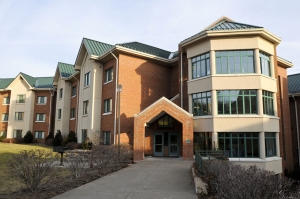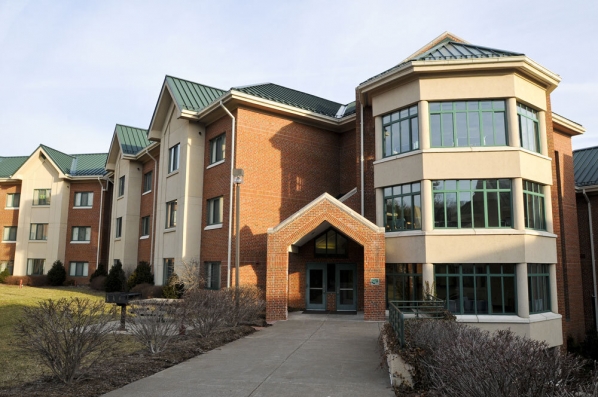On October 17, 2024 and Jan. 27, 2025, App State’s Water and Steam Systems Engineer was notified by the North Carolina Dept of Environmental Quality that elevated levels of haloacetic acids (HAA5s) remain in four university buildings after a regular quarterly water quality test on Jan. 7, 2025: Appalachian Heights, Student Recreation Center, Trivette Hall, Holmes Convocation Center.
The most recent diagnostic samples show that the HAA5 levels have decreased significantly since the last quarterly test in January 2025. They are now well below the compliance limit of 0.060 mg/L set by the NC Department of Environmental Quality (NCDEQ).
Appalachian Heights: 0.032 mg/L
Student Recreation Center: 0.031 mg/L
Trivette Hall: 0.028 mg/L
Holmes Convocation Center: 0.034 mg/L
These results represent a return to pre-Helene water quality samples and are indicative of the high quality water we have in our App State Reservoir. We are continuing to take confirmation samples and monitoring the results for any changes.
Due to the HAA5 levels present during the sampling periods of October 2024 and January 2025, the Appalachian State University Water Plant has received a violation for exceeding the average maximum contamination levels. The formal notification of the violation is attached to this email. Please note that this notification is in regards to the October 2024 and January 2025 compliance sampling and does not reflect the most recent diagnostic sampling.
As a reminder, HAA5s are disinfection by-products which are formed when chlorine is added to water to kill bacteria and other pathogenic microorganisms. The increased presence of HAA5s detected in October and January stemmed from sanitizing the university’s water following Hurricane Helene. Continued runoff of organic material in surface water, lakes, rivers and streams across Western NC, resulting from Hurricane Helene, required the university to operate in a standard operating mitigation process. During the treatment process, the university’s water system was treated with standard chlorination chemicals in order to make it safe to drink and use for personal hygiene.
View the results (PDF). These are also posted at facilitiesoperations.appstate.edu.
We will continue quarterly testing of our campus water to ensure levels remain below the compliance limits.
Below please find additional information, including safety information provided to the university by AppHealthCare, our local public health agency:
INFORMATION ABOUT YOUR APPALACHIAN STATE UNIVERSITY WATER SYSTEM TESTING
On Jan. 7, 2025 Appalachian State University performed regular quarterly water testing of its public water system. The test results came back on Jan 27, 2025 and indicated levels of haloacetic acids (HAA5s) exceeding allowable limits.
HAA5s are disinfection by-products which are formed when chlorine is added to water to kill bacteria and other pathogenic microorganisms. The increased presence of HAA5s in this case stems from sanitizing the university’s water following Hurricane Helene.
What should I do?
- Appalachian State University has consulted with AppHealthCare, your local public health agency, which has confirmed that at this time, no alternative source of water is necessary.
- If a situation arises where the water is no longer safe to drink, you will be promptly notified.
- You do not need to boil your water or take other corrective actions.
- HAA5s are not bacterial, viral, or fungal; it is a disinfection process byproduct. However, if you have specific health concerns, have a severely compromised immune system, have an infant, are pregnant, or are elderly, you may wish to seek advice from your health care provider about drinking this water.
- Although the university tap water is safe to drink, the university is providing bottled water to all residence halls, which can be picked up at Central Dining Hall during regular operating hours, if you do not feel comfortable drinking the water.
What does this mean?
- This is not an emergency. If it had been, you would have been notified. When disinfectants are used in the treatment of drinking water, they react with naturally occurring organic and inorganic matter and can produce HAA5s. Some people who drink water containing haloacetic acids in excess of the allowable limits over many years may have an increased risk of getting cancer.
- Building notices will remain posted until quarterly testing shows HAA5s levels have returned to allowable levels.
What is being done?
- In consultation with regulatory agencies, Appalachian State University is actively taking steps to ensure the water quality returns to allowable levels. This includes actively flushing the university’s water system and adjusting the chlorination chemicals to manage the formation of HAA5s while producing water that is safe to drink and use for personal hygiene since Oct. 8, 2024, and continues to do so.
- Filters in campus water bottle filling stations, which are located in buildings throughout campus, including residence halls, are changed several times throughout each semester. Activated carbon filters have been shown to be effective at reducing HAA5 level in tap water.
- Appalachian State University will continue to work with regulators on mitigation efforts until the HAA5s are below an allowable level.

